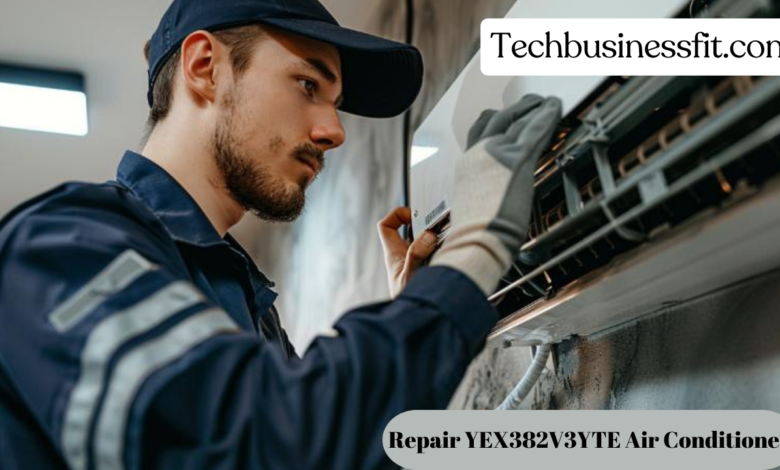Repair YEX382V3YTE Air Conditioner: A Comprehensive Guide

Maintaining and repairing your YEX382V3YTE air conditioner is essential to ensure consistent cooling performance, energy efficiency, and a longer lifespan for your unit. Whether you’re dealing with a common issue like poor cooling, strange noises, or water leaks, understanding how to troubleshoot and repair these problems can save you time and money. In this guide, we’ll explore various aspects of fixing the YEX382V3YTE air conditioner, from diagnosing common issues to preventive maintenance tips and when to call a professional.
Understanding the YEX382V3YTE Air Conditioner
The YEX382V3YTE is a modern air conditioner designed for efficient cooling, but like any complex appliance, it can develop issues over time. Understanding the main components of your unit—such as the compressor, evaporator coils, condenser coils, fan, and thermostat—will help you identify potential problems and fix them before they escalate.
Common malfunction symptoms include reduced cooling, unusual noises, frequent cycling (turning on and off too often), and water leakage. Let’s break down the typical issues and how to tackle them.
Diagnosing Common Issues in the YEX382V3YTE Air Conditioner
When your YEX382V3YTE air conditioner starts malfunctioning, the first step is identifying the symptoms. Some of the most common problems are:
- Poor cooling performance could be due to a clogged air filter, low refrigerant levels, or dirty coils.
- Frequent cycling: The unit turns on and off frequently, possibly caused by a malfunctioning thermostat, low refrigerant, or an oversized unit.
- Unusual noises: Buzzing or rattling sounds may indicate loose parts, a failing fan motor, or electrical issues.
- Water leaks: Water leakage is typically a sign of a clogged drain line or frozen evaporator coils.
Step-by-Step Guide to Repairing the YEX382V3YTE Air Conditioner
Once you’ve identified the problem, follow these steps to repair your air conditioner.
- Air Filter Cleaning or Replacement
A clogged air filter can significantly reduce cooling efficiency. To fix this, remove the air filter, clean it with water and mild soap, or replace it if it’s too dirty or damaged. Clean or replace the filter every 1-3 months to maintain optimal airflow.
- Cleaning Evaporator and Condenser Coils
Dirty coils are another common cause of reduced cooling performance. Turn off the power to your unit, then access the coils by removing the outer casing. Use a commercial coil cleaner to clean both the evaporator and condenser coils. Rinse them with a garden hose, ensuring that the water pressure is not too high to avoid damaging the coils.
- Fixing Water Leaks
Water leaks often result from a clogged condensate drain line. Locate the drain line (usually near the outdoor unit or inside near the evaporator) and clear any blockages using a wet/dry vacuum. You can also flush the line with bleach and water to prevent future clogs.
If the evaporator coils are frozen, turn off the unit to let them thaw, and check for issues like low refrigerant levels or restricted airflow that could be causing the freezing.
- Addressing Strange Noises
Unusual noises can indicate loose parts or a failing fan motor. Open the air conditioner, inspect the fan blades, and tighten any loose screws. If the motor is malfunctioning, it may need to be replaced. Use a multimeter to test the electrical continuity of the motor and replace it if necessary.
- Checking and Replacing the Thermostat
A malfunctioning thermostat can cause the air conditioner to cycle frequently or cool unevenly. Check that the thermostat is set correctly and replace its batteries if needed. If the problem persists, you may need to replace the thermostat entirely.
- Refrigerant Issues
Low refrigerant levels can severely impact the unit’s cooling ability. If you suspect a refrigerant leak, it’s best to call a professional, as handling refrigerants requires special tools and expertise. Proper care is crucial, as refrigerant leaks can also damage the environment.
Preventive Maintenance for the YEX382V3YTE Air Conditioner
To avoid future breakdowns and expensive repairs, regular maintenance of your YEX382V3YTE air conditioner is vital. Here are some maintenance tips:
- Clean or replace air filters every 1-3 months: This helps maintain optimal airflow and prevents dust buildup.
- Clean the evaporator and condenser coils annually: Dirty coils force the unit to work harder, increasing energy consumption and reducing cooling performance.
- Inspect the drain line periodically: Ensure the condensate drain is clear to avoid water leakage.
- Monitor refrigerant levels: If your system is consistently low on refrigerant, have a technician inspect for leaks.
- Check the fan and motor for debris: Keeping the fan blades and motor clean ensures smooth operation and reduces noise.
When to Call a Professional
While many minor repairs can be handled through DIY troubleshooting, specific issues should always be left to professionals. These include refrigerant leaks, electrical problems, and compressor failures. Attempting to fix these without proper tools and knowledge can lead to more damage and potential safety hazards.
If your air conditioner is more than 10-15 years old and requires frequent repairs, it may be time to replace it with a newer, more energy-efficient model.
FAQs About Repair YEX382V3YTE Air Conditioner
Q1: Why is my YEX382V3YTE air conditioner not cooling properly?
Check the air filter, thermostat settings, and refrigerant levels. Clean the coils and ensure there is no obstruction to airflow.
Q2: What causes water leaks in the YEX382V3YTE air conditioner?
Water leakage is typically caused by a clogged condensate drain line or frozen evaporator coils. Clear the drain line and allow the coils to thaw.
Q3: How often should I clean or replace the air filter?
It’s recommended to clean or replace the filter every 1-3 months, depending on usage and environmental conditions.
Q4: Why is my air conditioner making buzzing noises?
Loose parts, a failing motor, or debris in the fan blades could cause buzzing noises. Inspect the unit and tighten any loose components.
Q5: Can I fix a refrigerant leak myself?
No, a certified technician should only repair refrigerant leaks due to the complexity and environmental risks involved.
Also Read: Exploring the Benefits and Solutions Offered by https// mobilehomeexteriors.com


